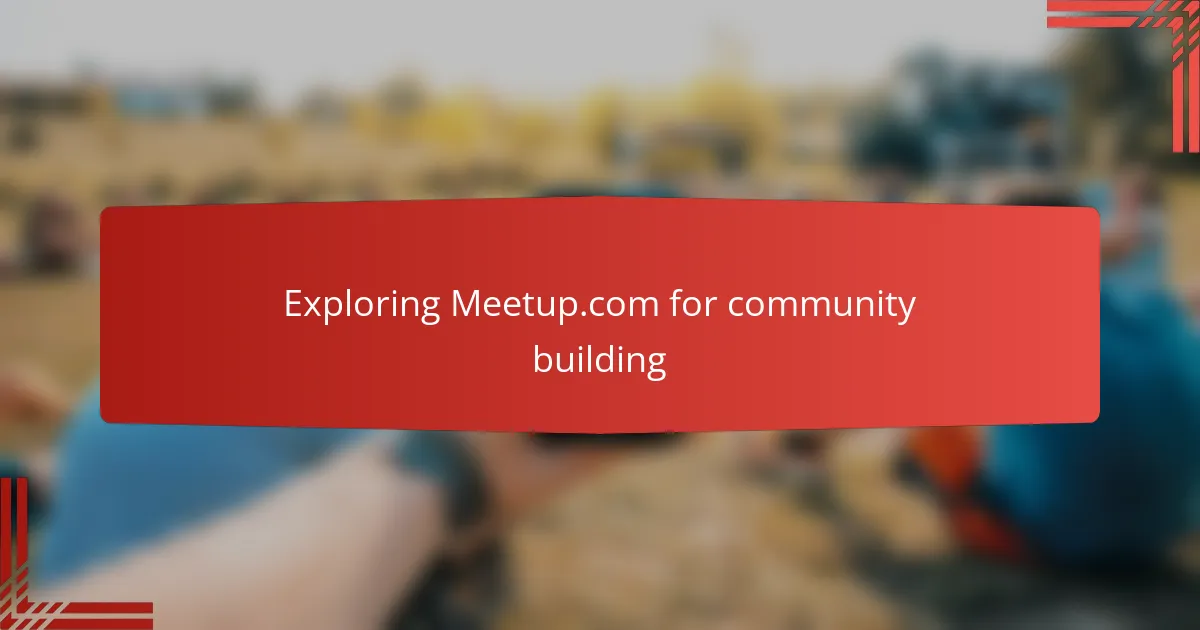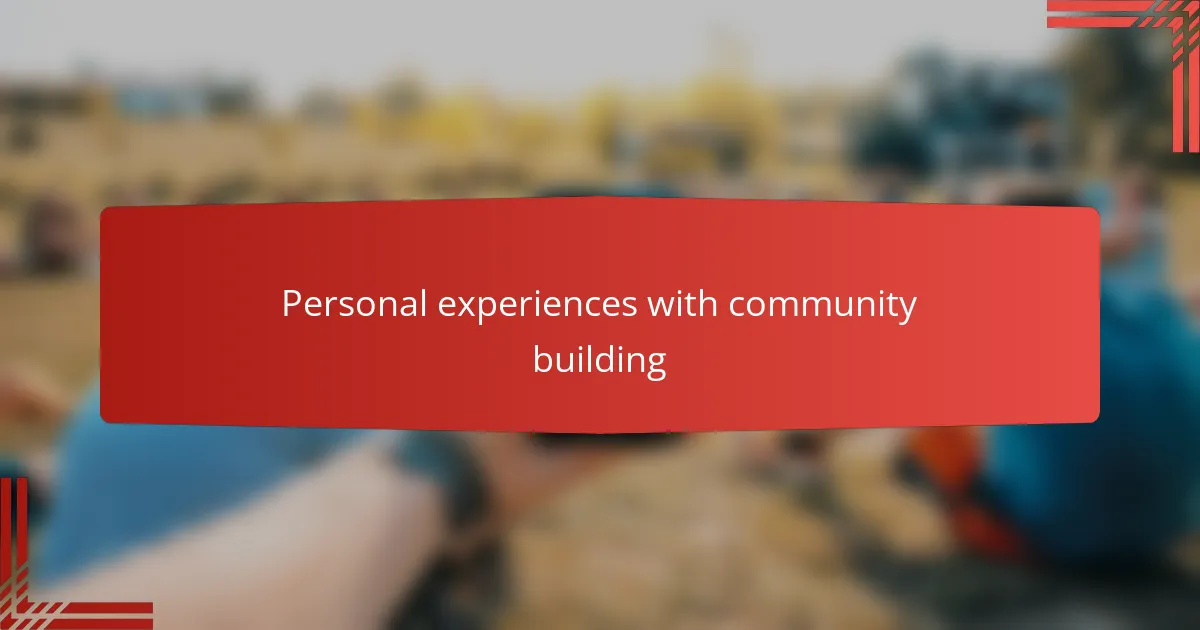Key takeaways
- Community life coaching fosters genuine connections and collective growth, emphasizing personal development within a supportive environment.
- Meetup.com democratizes community building, allowing anyone to create or join groups based on shared interests, thereby enhancing social interactions.
- Successful Meetup events should focus on a clear purpose, create an inclusive atmosphere, and balance structure with flexibility to promote engagement.
- Overcoming challenges in Meetup groups relies on prioritizing quality connections over quantity and maintaining open communication to address diverse member expectations.

Understanding community life coaching
Community life coaching, in my experience, is about more than just guidance; it’s about nurturing genuine connections within a group. Have you ever noticed how a trusted coach helps you see your potential not just as an individual, but as part of a larger community? That perspective can transform how people relate to one another.
I’ve found that the core of community life coaching lies in fostering a supportive environment where everyone feels seen and heard. It’s emotional work—helping others overcome barriers to connection, building trust step by step. Sometimes, it feels like planting seeds that grow into a flourishing network of encouragement.
What strikes me most is how this coaching encourages collective growth, blending personal development with community wellbeing. It raises the question: can we truly thrive on our own, or do we need a community to reflect and amplify our best selves? From my viewpoint, the answer is clear—community life coaching holds that key.

Exploring Meetup.com for community building
When I first explored Meetup.com, I was struck by how effortlessly it connects people with shared interests, no matter where they are. It’s like walking into a room full of potential friends, collaborators, or support systems, all eager to build something meaningful together. Have you ever felt that instant spark when discovering a group that just “gets” you? That’s the magic I see happening on Meetup.
What’s compelling to me is how Meetup.com democratizes community building. You don’t need to wait for an invitation or be part of an exclusive circle; anyone with a passion or purpose can create or join a gathering. I remember organizing a small meet-up focused on mindful living and was amazed by how quickly a core group formed, each person bringing their own energy and stories. It felt like planting roots in fertile soil.
Of course, Meetup isn’t a perfect solution, and sustaining momentum can be challenging. Yet, I keep asking myself: how often do we get such a ready platform that lowers barriers to connection? From my experience, it nudges us toward taking initiative, reminding me that communities are built one conversation, one event, one shared moment at a time.

Key benefits of Meetup groups
One key benefit I’ve noticed with Meetup groups is how they create a space where strangers quickly become allies. It’s powerful to witness people lean into vulnerability, sharing parts of themselves they might not elsewhere. Have you ever felt that sudden sense of belonging in a room full of new faces? Meetup often provides just that spark.
Another advantage is the diversity that each group brings. When I attended a local storytelling Meetup, I was amazed at the wide range of backgrounds and perspectives in the room. This variety not only enriches conversations but also broadens your understanding of community itself—it’s a mosaic rather than a single, uniform picture. Isn’t it exciting how new viewpoints can challenge and expand our thinking?
Lastly, I appreciate how Meetup empowers individuals to take ownership of their social lives and community involvement. Organizing or even attending events becomes an active choice rather than a passive experience. From my experience, this sense of agency fosters deeper commitment and, ultimately, a more resilient community. Have you noticed how participating in something you helped create feels so much more rewarding? That feeling is a quiet strength behind many successful Meetup groups.

Strategies for effective Meetup events
One strategy I’ve found essential for effective Meetup events is setting a clear, inviting purpose that resonates with attendees. When I organized a wellness-focused Meetup, I made sure every invitation highlighted how each event could offer practical support and genuine connection. Doesn’t clarity about the event’s value make it easier for people to commit and show up with enthusiasm?
Another approach that consistently works for me is creating a warm, inclusive atmosphere from the very start. Greeting each person by name and encouraging introductions helps break the ice faster. I recall one Meetup where a simple “share your why” round sparked heartfelt conversations and set the tone for authentic bonding. Have you noticed how small gestures like these transform strangers into friends?
Lastly, I believe mixing structure with flexibility keeps events engaging and comfortable. While having an agenda guides the group, allowing space for spontaneous discussions or activities invites deeper connection. In my experience, this balance prevents the event from feeling rigid and opens room for creativity and genuine interaction. What moments have you experienced when unexpected conversations led to meaningful connections?

Personal experiences with community building
Building community through Meetup.com has been a journey full of surprising moments for me. I remember one particular event where a newcomer shared a deeply personal story, and suddenly the room felt charged with empathy and trust. Have you ever experienced that instant shift when strangers become a real circle of support? It’s those moments that remind me why community building is so powerful.
At times, I’ve struggled with the ebb and flow of Meetup groups—keeping the momentum alive can be tricky. Yet, every challenge taught me something valuable about patience and perseverance. For instance, after a few quiet meetups, seeing regular members return with renewed enthusiasm was like watching a living network come to life again. It made me realize community building isn’t a sprint but a shared, evolving process.
One thing I’ve noticed over time is how personal commitment shapes the group’s energy. When I took the initiative to consistently engage before and after events, the connections deepened naturally. Have you found that investing a little effort in follow-up conversations turns casual acquaintances into lasting relationships? From what I’ve seen, that extra step is what turns a Meetup from just a gathering into a true community.

Tips for growing your Meetup community
One tip I always emphasize is the importance of consistent communication with your members. I remember when I started sending simple check-in messages or event reminders; it made a real difference. Have you noticed how a quick, friendly note can make people feel seen and encourage them to come back?
Also, creating smaller, more intimate subgroups within your Meetup can spark stronger connections. When I helped form a hiking subgroup inside a larger wellness community, participants bonded faster, sharing stories and support beyond the main events. Doesn’t it feel easier to open up when you’re with a few familiar faces?
Finally, I’ve learned that celebrating milestones—whether it’s the 10th event or the 50th member—adds a sense of shared achievement. In one group I managed, acknowledging these moments with small gestures energized everyone and reinforced our collective pride. Have you experienced how recognizing progress fuels motivation and deepens commitment?

Overcoming challenges in Meetup groups
Overcoming challenges in Meetup groups often boils down to managing the inevitable dips in attendance and enthusiasm. I’ve noticed that when turnout wanes, it’s easy to feel discouraged, but what helped me was shifting focus from numbers to quality of connection. Have you ever found that even a small gathering can ignite more meaningful interactions than a large, impersonal crowd?
Another challenge I’ve faced is balancing diverse expectations within the group. Different people come with varied hopes—some seek deep conversation, others casual fun. In my experience, openly acknowledging these differences and inviting feedback creates a space where everyone feels valued. I wonder, have you tried checking in regularly to align the group’s vibe with its members’ evolving needs?
Sometimes, external factors like scheduling conflicts or seasonal changes pose hurdles too. I once had to cancel an event last minute because of poor weather, and it felt like a setback. Yet, reaching out personally to share updates and propose alternatives actually strengthened trust among members. Isn’t it interesting how transparent communication can turn a challenge into an opportunity for deeper connection?